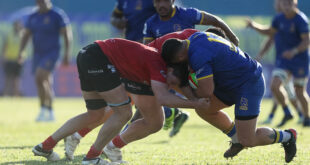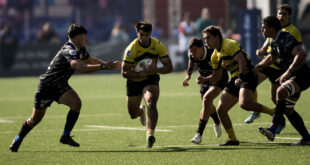As a fan of the global game I take greater pleasure out of watching the pool phase of Rugby World Cups than many people certainly do but now this appears to have changed, and for the better. So good have the group matches been that we have been treated to more upsets than previously and a clear closing in the divide that separates the developed from the developing.
The Past
Looking back to the three previous World Cups that have operated according to the same format is telling. When it began in 2003 there were some staggering results such as Tonga losing 91-7 against New Zealand, Fiji losing 61-18 against France, Samoa losing 60-10 against South Africa, Uruguay and Georgia losing 111-13 and 84-6 against England, Namibia losing 142-0 against hosts Australia and Romania also falling by 90-8 to the hosts.
This saw a call made by none other than the IRB (now World Rugby) itself to reevaluate the number of participants from 20 to 16 during Rugby World Cup 2007. With there being a fairer schedule the results were improved but lop-sided results were again evident. Wales won 77-18 against Japanand Australia did so by 91-3, New Zealand won 108-13 vs Portugal, South Africa won 59-7 against Samoa and France won 64-7 and 87-10 against Georgia and Namibia.
In 2011 Japan lost 83-7 against New Zealand while Canada did so by 79-15. Namibia suffered 87-0 and 81-7 defeats against South Africa and Wales while Romania lost 67-3 against England. Australia won 67-5 against the USA and Fiji lost 66-0 against Wales. Debutants Russia were winless with their largest losing margin being 50 points against Ireland while Australia won 68-22.
The Present
With us now just one match away from completing half of all pool matches a bold statement can be made with confidence – the gap is closing. The one remaining game, Namibia vs Tonga, is not likely to see favorites Tonga winning by a score such as those started above. I say this based on how Namibia played against New Zealand and how Tonga did against Georgia.
The Africans were never in with a chance of winning against New Zealand. The 58-14 result saw Namibia praised as having played well. It was a far lower margin than that against Australia in 2003, France in 2007 or South Africa in 2011. Similar trends are the case when looking at other teams.
Uruguay were written off in certain areas as being able to compete at all yet proved to be more than capable in most areas of play. Their quality is clearly not up to that of Wales or Australia yet their losses of 54-9 and 65-3 are a world apart from the 2003 loss against England.
Romania’s mission impossible of facing France and Ireland on a three day turn-around saw the Eastern Europeans losing by scorelines of 38-11 and 44-10 making Canada’s 50-7 loss against Ireland larger. Canada followed it up by almost knocking-over Italy. Similarly, the USA’s poor second half saw Scotland winning 39-16 after being behind at half time. The Eagles went closer vs Samoa, losing 25-16.
Fiji is another interesting case given the team lost by 66 points four years ago. The Pacific Islanders were then chosen to open the World Cup and troubled England who were only able to claim the bonus point with the final play of the game. After four days rest Fiji then denied Australia a bonus point in Cardiff.
Fiji’s neighbors Tonga opened the tournament four years ago and were a mixed bag in losing to Canada yet defeating France. Georgia, so far, has an important win over Tonga and a 54-9 loss against Argentina. Then there is Japan who completed one of sports biggest ever upsets against South Africa.
The Future
In one way or another all 20 teams deserve their place at the World Cup. If it were a sixteen team, rather than 20, the results would be much the same. I use this as my point of departure to look to the future. The question is are there additional teams capable of competing to a similar level to that of the likes of Namibia, Romania and Uruguay?
Portugal, Spain and Russia have only played at one World Cup a piece but they are all have a demonstrated list of performances to suggest that they are at or near the required level. Then there is Chile a country which defeated Uruguay earlier this year and will play in the annual Americas Rugby Cup.
2019 will be a 20 team World Cup but 2023 could include more. That being the case the above mentioned four countries would all be potential competitors. Others could be added such as Kenya and Zimbabwe with the former having defeated Namibia in Rugby World Cup qualification a year ago.
A variety of possible formats exist for a 24-team format with six pools of four being potentially the most likely. This being the case it would involve a Round-of-Sixteen between the Pool Stage and Quarter Finals. Teams would not play more matches of the variety of Australia vs Uruguay than they do at present while the potential for more exciting fixture similar to Canada vs Italy and Georgia vs Tonga would be increased.
A final point to consider is financial. Would adding four of Chile, Kenya, Portugal, Spain and Russia make economic sense? Yes, it would absolutely. Considering that some 30 million Japanese watched their country’s second pool match against Scotland it is quiet clear that there is a market to be tapped into. 30 million is some 26 million more than the total population of New Zealand.
With adequate World Rugby funding a 24-team event is more than possible for 2023 and the audience will increase substantially.
 Americas Rugby News Rugby news from across the Americas!
Americas Rugby News Rugby news from across the Americas!




